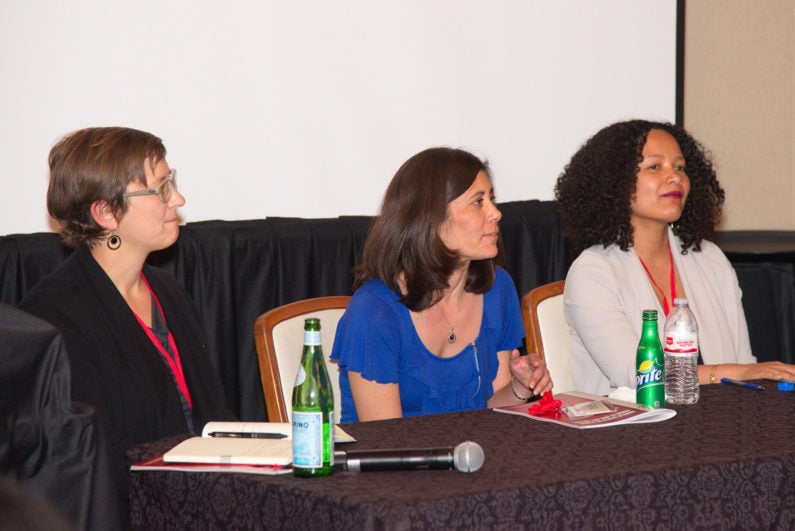Stanford hosts women of color who aspire to academic careers
Stanford recently welcomed more than four dozen women to campus from around the country for “Women of Color in the Academy – Staying Fit: Mind, Body, and Soul.”
Fifty women who have set their sights on academic careers recently gathered at Stanford for “Women of Color in the Academy – Staying Fit: Mind, Body, and Soul,” a conference designed to promote strategies for achieving success in academia.
The 2½-day gathering, designed for advanced doctoral students, postdoctoral scholars and early career faculty members, opened with the address, “To Thrive in the Academy, ROAR!” delivered by Karan L. Watson, provost, executive vice president, and professor of computer science and electrical engineering at Texas A&M University. (ROAR is an acronym for Resilience, Optimism, Anger-management and Rescuing-yourself.)

Risa Wechsler, Julia Miyaoka and Debbie Senesky appeared on the panel, “Crafting Your Space in the Academy: Paths to Independence in Research and Teaching,” at Stanford. (Image credit: Michael Kendrick)
Rania Sanford, assistant vice provost for faculty development and diversity and co-chair of the conference, said participants – selected from nearly 1,000 applicants across the nation – represented a diverse range of academic institutions and disciplines.
Among the participants were 15 advanced doctoral students, postdoctoral scholars and faculty members from Stanford.
The conference offered workshops on a variety of topics by Stanford faculty members and visiting scholars, including:
- “The Power of Intersectionality: Our Common Journeys, Our Separate Ways,” presented by Stacy Blake-Beard, a professor of management at the Simmons College School of Management in Boston and co-chair of the conference.
- “Storytelling for a Successful Academic Career,” presented by Paula Moya, a professor of English at Stanford.
- “Being Our Best Selves: Mobilizing Independence and Interdependence in the Academy” presented by Hazel Rose Markus, a professor of psychology at Stanford.
The conference also offered workshops on the importance of maintaining balance while undertaking the many demands of academic life.
“The goal of the conference was to attend to the whole person and illustrate that physical and mental health is part and parcel of thriving as a scientist or intellectual,” Sanford said.
Carol B. Muller, executive director of Stanford WISE Ventures and a co-chair of the conference, said the event provided many opportunities to establish professional bonds. Wise Ventures is a joint project of the Vice Provost for Faculty Development and Diversity and the Vice Provost for Graduate Education.
“Strong peer networks can be critical to academic success, particularly for scholars who see too few individuals like themselves in academic work and who encounter micro-exclusions on a regular basis as a result of their gender, race and/or ethnicity,” she said.
Muller said women of color are particularly underrepresented in academia.
“For that situation to improve, all institutions of higher education must contribute to solutions by helping develop current and future faculty for successful academic careers and by working to dismantle barriers to their full participation,” she said.
